人教版八年级上册第二单元知识点
人教版英语八年级上册第二单元必考知识点

Unit2 How often do you exercise?1. exercise (v/n)的用法1)(动):锻炼. 如:He exercises every day.2) (可数名词):“...操;练习”. 如:do morning/ eye exercises; do math exercises(不可数名词):“锻炼;运动”讲:如:We often do / take exercise on weekends.2. go shopping 意为“去购物”。
Go+ v- ing : 表示进行某项活动。
如:Go swimming/ shopping/skating/skiing/fishing/climbing/hiking3.频率副词:always=all the time一直, usually, often, sometimes=at times , hardly ever, never4.sometimes: 有时候;sometime:某时;some times:许多次/倍; some time: 一段时间5. hard:(1)硬的;困难的;严厉的;勤奋的(形容词)a hard writer(2) 努力地;猛烈地(副词)study/rain hard6.注意:表示“一次或两次”时,一般用once和twice表示。
如:once a month(一个月一次)而表示“三次或以上”时,则用“数词+times”结构。
如:five times a year (一年五次)7.由how构成的疑问词组的用法(1)how many+ 可数名词复数如:how many programs(2)how much+不可数名词如:how much coffee但how much=what’s the price of..? 还有“多少钱”的意思如:How much are those pants?(3)how many times: “多少次”. 其答语表示次数。
人教版八年级英语上册Unit 2重要知识点讲解

Unit2How often do you exercie?重要知识点讲解惯用法:1. help sb. with sth 帮助某人做某事2. How about…? ….怎么样?/ ….好不好?3. want sb. to do sth. 想让某人做某事4. How many + 可数名词复数+ 一般疑问句….有多少…..5. 主语+ find+ that 从句…发现…6. It’s + adj.+ to do sth. 做某事是….的7. spend time with sb. 和某人一起度过时光8. ask sb. about sth. 向某人询问某事9. by doing sth. 通过做某事10. What’s your favorite…..? 你最喜欢的……是什么?11 start doing sth. 开始做某事12. the best way to do sth.做某事的最好方式词语辨析:1. how often 多久一次,用来提问动作发生的频率。
回答用:once,twice, three times 等词语。
How often do you play sports? Three times a week.how long 多长,用来询问多长时间,也可询问某物有多长。
How long does it take to get to Shanghai from here? How long is the ruler?how for 多远,用来询问距离,指路程的远近。
How far is it from here to the park? It’s about 2 ki lometers.2.free 空闲的,有空的,反义词为busy.be free 有空,闲着,相当于have time.I’ll be free next week. = I’ll have time next week.还可作“免费的、自由的”解。
初中英语 人教版八年级上册第二单元知识点
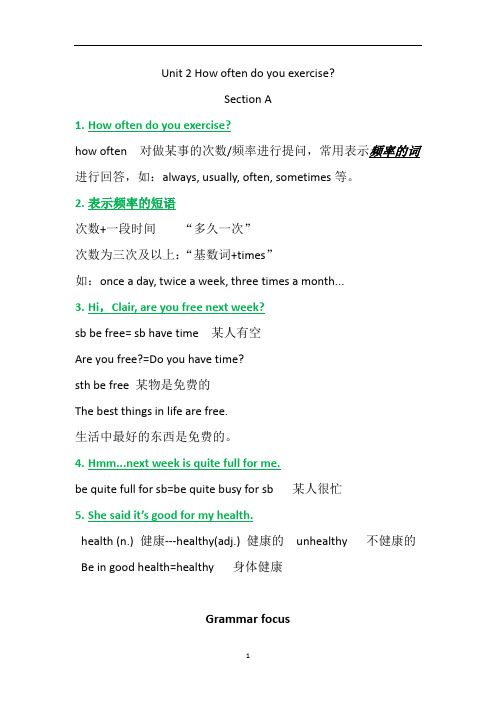
Unit 2 How often do you exercise?Section A1.How often do you exercise?how often 对做某事的次数/频率进行提问,常用表示频率的词进行回答,如:always, usually, often, sometimes等。
2.表示频率的短语次数+一段时间“多久一次”次数为三次及以上:“基数词+times”如:once a day, twice a week, three times a month...3.Hi,Clair, are you free next week?sb be free= sb have time 某人有空Are you free?=Do you have time?sth be free 某物是免费的The best things in life are free.生活中最好的东西是免费的。
4.Hmm...next week is quite full for me.be quite full for sb=be quite busy for sb 某人很忙5.She said it’s good for my health.health (n.) 健康---healthy(adj.) 健康的unhealthy 不健康的Be in good health=healthy 身体健康Grammar focus6.How often的用法how often 用来对表示做某事的频率进行提问,回答时可以用表示频率副词或表示频率的短语进行回答。
如:---How often do you go shopping?(1)---I often go shopping. (频率副词回答)(2)---I go shopping twice a week. (频率短语回答)2.频率副词位置:be之后,动之前。
(be动词之后,Shiite动词之前)频率词及发生概率大小(由大到小):Always, usually, often, sometimes, hardly ever, never(100%--0%) 3.频率短语位置:句尾次数+一段时间如:---How often do you watch TV?---I watch TV twice a week.4.与how相关的短语(1)怎么,怎样。
人教版八年级英语上册Unit2知识点汇总总结
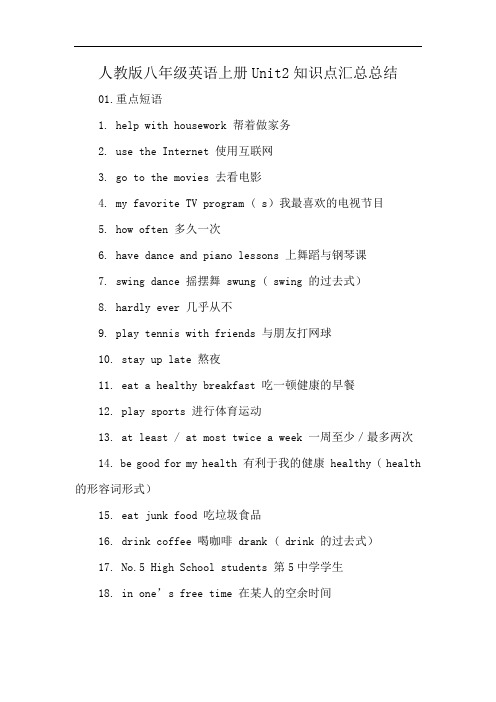
人教版八年级英语上册Unit2知识点汇总总结01.重点短语1. help with housework 帮着做家务2. use the Internet 使用互联网3. go to the movies 去看电影4. my favorite TV program ( s)我最喜欢的电视节目5. how often 多久一次6. have dance and piano lessons 上舞蹈与钢琴课7. swing dance 摇摆舞 swung ( swing 的过去式)8. hardly ever 几乎从不9. play tennis with friends 与朋友打网球10. stay up late 熬夜11. eat a healthy breakfast 吃一顿健康的早餐12. play sports 进行体育运动13. at least / at most twice a week 一周至少/最多两次14. be good for my health 有利于我的健康 healthy ( health 的形容词形式)15. eat junk food 吃垃圾食品16. drink coffee 喝咖啡 drank ( drink 的过去式)17. No.5 High School students 第5中学学生18. in one’s free time 在某人的空余时间19. ask them about their free time activities 询问他们关于他们的业余活动20. not … at all 根本不…21. go online 上网22. be surprised that ..感到惊讶23. use it for fun 为了取乐而使用它24. the answers to the questions 这些问题的答案25. one to three times a week 一周一到三次26. two percent of the students 2%的学生27. the best way to do sth.做某事的最好方式28. such as 例如29. spend time with your friends 与你的朋友共度时光spent ( spend 的过去式)30. spend time on sth./ in doing sth.花时间在某事上/做某事31. play together 一起玩32. watch TV for over 2 hours 看两个多小时电视33. go to the dentist 去看牙医34. a 16-year-old high school student 一名16岁的中学生35. have a lot of good habits 有许多好习惯36. more / less than two hours 多/少于两小时37. go to the dentist for teeth cleaning 去牙医处清洁牙齿38. go to the shopping center 去购物中心02.重点句子语法聚焦1. --What do you usually do on weekends?你在周末通常做什么?--I always exercise.我总是锻炼。
八年级上册英语人教版第二单元笔记

八年级上册英语人教版第二单元笔记一、重点单词。
1. housework.- 不可数名词,意为“家务劳动;家务事”。
例如:I often help my mother with the housework.(我经常帮助我妈妈做家务。
)2. hardly.- 副词,意为“几乎不;几乎没有”,本身具有否定意义。
例如:He can hardly speak English.(他几乎不会说英语。
)3. ever.- 副词,意为“在任何时候;从来;曾经”。
例如:Have you ever been to Beijing?(你曾经去过北京吗?)4. once.- 副词,意为“一次;曾经”。
作“一次”讲时,可用于表示频率。
例如:I go to the movies once a week.(我每周去看一次电影。
)5. twice.- 副词,意为“两次;两倍”。
例如:I have read this book twice.(我已经读过这本书两次了。
)6. Internet.- 名词,意为“(国际)互联网;因特网”。
例如:We can get a lot of information on the Internet.(我们能在互联网上得到很多信息。
)7. program.8. full.- 形容词,意为“忙的;满的;充满的”。
be full of = be filled with,意为“充满……”。
例如:The glass is full of water.(杯子里装满了水。
)9. maybe.- 副词,意为“大概;或许;可能”,通常放在句首。
例如:Maybe he is at home.(也许他在家。
)10. swing.- 名词,意为“摆动;秋千”;作动词时,意为“(使)摆动;摇摆”。
例如:There is a swing in the park.(公园里有一个秋千。
)The monkey is swinging from tree to tree.(猴子在树间荡来荡去。
初中英语人教版八年级上册第二单元知识点

初中英语人教版八年级上册第二单元知识点Unit 2 How often do you exercise?n A1.How often do you exercise?how often对做某事的次数/频率进行提问,常用表示频率的词进行回答,如:always。
usually。
often。
sometimes等。
2.表示频率的短语次数+一段时间“多久一次”次数为三次及以上:“基数词+times”如:once a day。
twice a week。
three times a month。
3.Hi,Clair。
are you free next week?sb be free= sb have time某人有空Are you free?=Do you have time?XXX某物是免费的XXX.糊口中最好的工具是免费的。
4.Hmm。
next week is quite full for me.be quite full for sb=be quite busy for sb某人很忙5.She said it’s good for my health.health (n.)安康---XXX(adj.)安康的XXXBe in good health=healthy身材安康Grammar focus1不安康的6.How often的用法how often用来对透露表现做某事的频次举行发问,回覆时能够用透露表现频次副词或透露表现频次的短语举行回覆。
如:How often do you go shopping?1)---Ioftengo shopping。
(频次副词回覆)2)---I go shopping twice a week。
(频次短语回覆)2.频次副词位置:be之后,动之前。
(be动词之后,Shiite动词之前)频率词及发生概率大小(由大到小):Always。
usually。
often。
sometimes。
人教版八年级上英语第二单元知识点总结

人教版八年级上英语第二单元知识点总结一、语法知识点总结1. 一般现在时在人教版八年级上英语第二单元中,我们学习了一般现在时的用法。
一般现在时表示习惯性、经常性或普遍性的动作或状态。
例如:She usually goes to the park on Sundays. (她通常在星期天去公园。
)2. 现在进行时现在进行时表示现阶段正在进行的动作。
例如:I am reading a book now. (我现在正在读一本书。
)3. 物主形容词物主形容词用来表达人或物所拥有的事物。
例如:My father’s car is blue. (我爸爸的车是蓝色的。
)4. 物主代词物主代词与名词具有相同的作用,用来表示所属关系。
例如:This is your book. (这是你的书。
)5. 反身代词反身代词用来强调主语,表示动作的主语也是动作的受事。
例如:Ihurt myself when I fell. (我摔倒时弄伤了自己。
)二、重点词汇总结1. join in 参加2. activity 活动3. club 俱乐部4. exercise 练习5. conversation 对话以上是对人教版八年级上英语第二单元的语法知识点和重点词汇进行了总结。
总结回顾:在本单元中,我们学习了一系列与日常生活相关的语法知识点和重点词汇。
通过掌握这些知识点和词汇,我们可以更好地表达自己,理解他人说的话,并参与到各种英语活动中去。
通过学习这些知识点和词汇,我们也可以更好地理解和使用一般现在时、现在进行时等语法知识,提高自己的英语水平。
个人观点和理解:学习语言需要不断地积累和实践,只有通过不断地实践,我们才能更好地掌握语言。
在学习英语的过程中,我们要注重词汇的积累和语法知识的理解,同时要多参与各种英语活动,提高自己的口语表达能力。
只有这样,我们才能真正地运用所学的知识,流利地表达自己的想法。
结语:通过本文的总结和回顾,相信大家对人教版八年级上英语第二单元的知识点有了更深入的理解。
人教版八年级英语上册第二单元知识点

人教版八年级英语上册第二单元知识点摘要:I.单元简介A.单元主题B.单元目标C.单元结构II.词汇与语法A.词汇1.名词2.动词3.形容词4.副词B.语法1.一般现在时2.一般过去时3.一般将来时III.句型与对话A.句型1.疑问句2.祈使句3.感叹句B.对话1.日常问候与介绍2.家庭与朋友3.学校生活IV.阅读理解A.文章概述B.问题与解答V.听力理解A.听力材料B.问题与解答VI.写作训练A.写作主题B.写作要求C.写作示例VII.单元总结A.重点知识点回顾B.学习建议正文:人教版八年级英语上册第二单元以日常交际为主题,通过各种语言技能训练,帮助学生掌握基本的日常英语交流能力。
本单元的目标是让学生学会使用一般现在时、一般过去时和一般将来时表达现在、过去和未来的情况,同时学习并运用各种词汇、语法、句型和对话,提高学生的英语综合素质。
一、词汇与语法本单元的词汇包括名词、动词、形容词和副词。
学生需要掌握这些词汇的用法,以便在实际交流中准确表达意思。
在语法方面,本单元主要教授一般现在时、一般过去时和一般将来时,帮助学生更好地描述日常生活中的各种情况。
二、句型与对话本单元介绍了疑问句、祈使句和感叹句等句型,以及日常问候与介绍、家庭与朋友、学校生活等场景的对话。
学生需要熟练掌握这些句型和对话,以便在实际交流中更加自信地表达自己。
三、阅读理解本单元的阅读理解部分提供了多篇与主题相关的文章,学生需要通过阅读这些文章,理解文章内容,并回答相关问题。
这有助于提高学生的阅读理解能力,培养他们的英语思维。
四、听力理解听力理解部分为学生提供了与主题相关的听力材料,学生需要听懂材料内容,并回答相关问题。
通过听力训练,学生可以提高自己的听力水平,更好地理解和运用英语。
五、写作训练本单元的写作训练要求学生根据主题进行写作,学会用英语表达自己的观点和想法。
通过写作训练,学生可以巩固所学知识,提高自己的英语写作能力。
总之,本单元为学生提供了一个全面、系统的英语学习环境,通过各种语言技能训练,帮助学生掌握基本的日常英语交流能力。
人教版八年级数学(上)第二单元重点知识点

人教版八年级数学(上)第二单元重点知识点知识点1: 根式的运算1. 同类项的根式可以直接进行加减运算,结果仍为同类项的根式。
2. 根式可以与整数进行加减运算,运算结果仍为根式。
知识点2: 平方根与立方根1. 平方根和立方根是指一个数的平方和立方的根,平方根用符号√表示,立方根用符号∛表示。
2. 计算平方根和立方根时,可以使用计算器来辅助求解。
知识点3: 分数指数幂1. 求一个数的分数指数幂,可以将指数的分母作为根式的指数,将指数的分子作为底数的指数。
2. 分数指数幂的运算结果为一个根式,可以进行化简和约分。
知识点4: 整除与余数1. 两个整数a和b,如果可以整除,即a可以被b整除,记作a÷b,余数为0。
2. 整除运算可以用来判断一个数是否是另一个数的倍数。
知识点5: 除数和倍数1. 整数a是整数b的倍数,即a可以被b整除,可以写成a是b的n倍。
2. 整数b是整数a的除数,即b可以整除a,可以写成b是a的约数。
3. 两个整数的最小公倍数是它们的公共倍数中最小的一个。
知识点6: 素数和合数1. 素数是指除了1和本身外没有其他约数的自然数,例如2、3、5、7等。
2. 合数是指除了1和本身外还有其他约数的自然数,例如4、6、8、9等。
3. 任何一个大于1的数,都能被素数唯一分解。
知识点7: 素因数分解1. 素因数分解是指将一个合数分解为一系列素数的乘积。
2. 素因数分解可以使用质因数分解法进行计算。
知识点8: 最大公约数和最小公倍数1. 最大公约数是指两个或多个数共有的约数中最大的一个。
2. 最小公倍数是指两个或多个数的公共倍数中最小的一个。
3. 最大公约数和最小公倍数有着特定的计算方法和性质。
知识点9: 分数的加减运算1. 对于分数的加减运算,需要先找到它们的最小公倍数,并将分母化为最小公倍数的倍数。
2. 分数的加减运算结果为一个分数,可以进行化简和约分。
知识点10: 分数的乘除运算1. 对于分数的乘除运算,可以直接对分子和分母进行对应的运算。
人教版初二英语八年级上册Unit2知识点

人教版初二英语八年级上册Unit2知识点Unit2 How often do you exercise?【重点语法】1. 频率副词: always,usually, often, sometimes, never频率副词在句中通常放在实义动词之前, be动词或助动词之后。
常用于一般现在时态中。
2.“次数”的表达方法一次once,两次twice,三次或三次以上:基数词+ times, 如:three times, five times,3. how often“多久一次”问频率,回答常含有频率词组或短语。
常见的how疑问词:1)How soon 多久(以后)—How soon will he be back?他多久能回来?—He will be back in amonth. 他一个月后能回来。
2)how long “多久”—How long did it take you toclean the house? 你打扫房子用了多久?—It took me half an hour to cleanthe house. 我打扫这房子用了半小时。
3)How many+名复How much+不可名“多少” 问数量(how much 还可问价格)【重点短语】1. go to the movies 去看电影2. look after = take care of 照顾3. surf the internet 上网4. healthy lifestyle 健康的生活方式5. go skate boarding 去划板6. keep healthy=stay healthy 保持健康7. eating habits 饮食习惯8. take more exercise 做更多的运动9. the same as 与什么相同10. be different from 不同11. once a month一月一次12. twice a week一周两次13. make a difference to 对......有影响/作用14. most of the students=moststudents15. shop=go shopping=do someshopping 购物16. be good for 对......有益17. be bad for 对......有害18. come home from school放学回家19. of course = certainly = sure 当然20. get good grades 取得好成绩21. keep/be in good health 保持健康22. take a vacation 去度假【词语辨析】1.maybe / may bemaybe 是副词,意为“大概,可能,或许”,一般用于句首。
人教版八年级上册第二单元知识点归纳
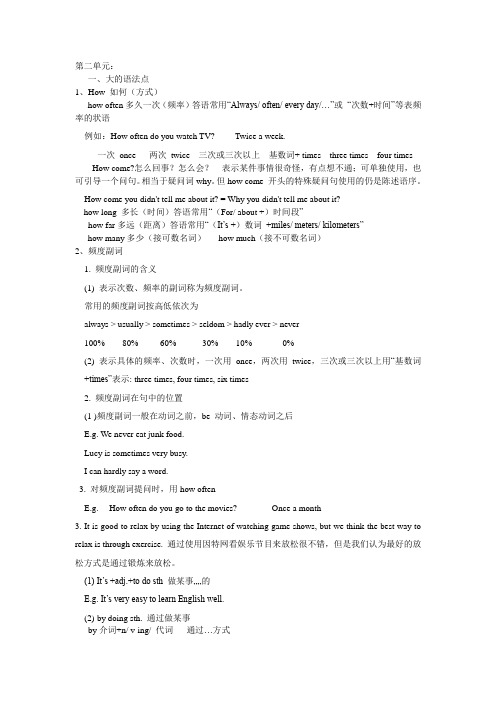
第二单元:一、大的语法点1、How 如何(方式)how often多久一次(频率)答语常用“Always/ often/ every day/…”或“次数+时间”等表频率的状语例如:How often do you watch TV? ----Twice a week.一次once 两次twice 三次或三次以上基数词+ times three times four times How come?怎么回事?怎么会?表示某件事情很奇怪,有点想不通;可单独使用,也可引导一个问句。
相当于疑问词why。
但how come 开头的特殊疑问句使用的仍是陈述语序。
How come you didn't tell me about it? = Why you didn't tell me about it?how long 多长(时间)答语常用“(For/ about +)时间段”how far多远(距离)答语常用“(It’s +)数词+miles/ meters/ kilometers”how many多少(接可数名词)how much(接不可数名词)2、频度副词1. 频度副词的含义(1) 表示次数、频率的副词称为频度副词。
常用的频度副词按高低依次为always > usually > sometimes > seldom > hadly ever > never100% 80% 60% 30% 10% 0%(2) 表示具体的频率、次数时,一次用once,两次用twice,三次或三次以上用“基数词+times”表示: three times, four times, six times2. 频度副词在句中的位置(1 )频度副词一般在动词之前,be 动词、情态动词之后E.g. We never eat junk food.Lucy is sometimes very busy.I can hardly say a word.3. 对频度副词提问时,用how oftenE.g. ---How often do you go to the movies? ---Once a month3. It is good to relax by using the Internet of watching game shows, but we think the best way torelax is through exercise. 通过使用因特网看娱乐节目来放松很不错,但是我们认为最好的放松方式是通过锻炼来放松。
人教版英语八年级上册第二单元短语语法知识点总结

Unit 2 How often do you exercise 一、词组、短语:01、help with housework 帮助做家务活,02、go shopping 购物,03、on weekends 在周末,04、how often 多久一次,05、hardly ever几乎不,06、once a week 每周一次,07、twice a month每月二次,08、go to the movies去看电影,09、every day 每天,10、use the Internet上网/用网,11、be free有空,12、have dance and piano lessons 上舞蹈钢琴课,13、swing dance摇摆舞14、play tennis 打网球,15、stay up late熬夜,16、at least至少,17、go to bed early 早睡,18、 play sports 锻炼身体,19、be good for 对…有好处,20、go camping去野营,21、in one’s free time 在某人的空闲时间,22、not….at all 根本不,23、the most popular 最流行,24、such as例如,25、go to the dentist去看牙医,26、more than 超过/多于,27、Old habits die hard.旧习惯难改。
28、 hard=difficult 困难的,29、less than 少于/不到二、重要句子(语法):What do you usually do on weekends你周末通常做什么 I always exercise.总是锻炼身体。
What do they do on weekends他们周末干什么 They often help with housework.他们经常帮助干家务活。
What does she do on weekends 她周末干什么 She sometimes goes shopping.她有时购物。
八年级上册英语unit2知识点归纳人教版
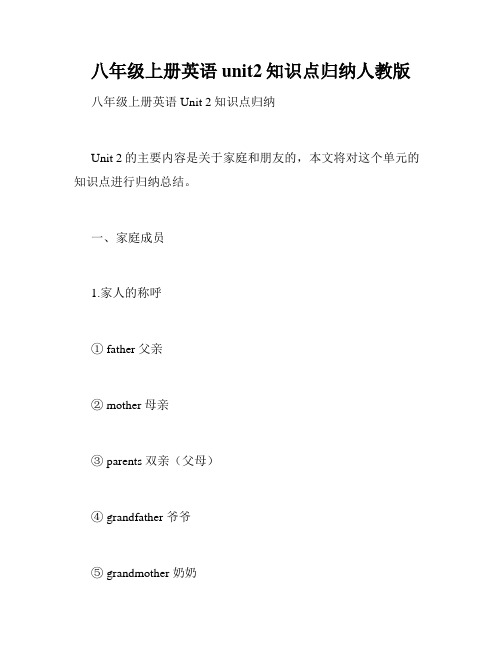
八年级上册英语unit2知识点归纳人教版八年级上册英语Unit 2知识点归纳Unit 2的主要内容是关于家庭和朋友的,本文将对这个单元的知识点进行归纳总结。
一、家庭成员1.家人的称呼① father 父亲② mother 母亲③ parents 双亲(父母)④ grandfather 爷爷⑤ grandmother 奶奶⑥ grandparents 祖父母(外公外婆或者爷爷奶奶)⑦ son 儿子⑧ daughter 女儿⑨ children 孩子⑩ elder brother 哥哥⑪ younger brother 弟弟⑫ elder sister 姐姐⑬ younger sister 妹妹2.家庭成员的职业father:teacher, doctor, businessman, worker…mother:nurse, musician, artist, housewife…grandfather / grandmother:retired, farmer, scientist, writer…brother / sister:student, athlete, musician, artist, …二、家务1.厨房用具① microwave 微波炉② refrigerator 冰箱③ stove 火炉④ oven 烤箱⑤ blender 搅拌器⑥ toaster 烤面包机⑦ kettle 水壶2.家务动词① cook 做饭② wash the dishes 洗碗③ sweep 扫地④ mop 拖地⑤ clean the bathroom 打扫浴室⑥ make the bed 整理床铺⑦ do the laundry 洗衣服三、朋友1.朋友类型① best friend 最好的朋友② close friend 亲密的朋友③ new friend 新朋友④ childhood friend 童年时的朋友⑤ schoolmate 同学2.谈论朋友的习惯和特点① He / She is always there for me. 他 / 她总是在我身边。
人教版英语 八上第二单元知识点

八年级上册第二单元一、单词hardly adv.几乎不,几乎没有hard adj.坚硬的、坚固的、困难的、努力的、冷酷无情的、硬心肠的、苛刻的、寒冷的、凛冽的full adj.忙的,满的,充满的,饱的-反义词hungry饥饿maybe 大概也许可能may beat least 至少at most最多health 健康;人的身体状态-healthy健康的online adj.在线的,联网的--反义词offline断网的,下线的although =though虽然、尽管、即使mind n.头脑、心智brain n.脑、大脑head n.头;头脑;脑筋(包括brain and mind)such as 例如,像....一样for example 例如,譬如die v.死亡、消失、消亡dead adj.死的、失去生命的、枯萎的death n.死、死亡;生命的状态终止、死亡状态;死神writer n.作者、作家write v.书写、写作、作曲、编写more than 多于;超过less than少于point n.得分、点;v.指、指向二、词组on weekends =at/on the weekend 在周末go to the movies去看电影help with housework帮忙做家务read a book/books/English book 看书/看英语书watch TV 看电视go shopping =do some shopping去购物use the internet 使用互联网、使用网络use of the internet网络的使用be free 有空,空闲swing dance 摇摆舞,爵士舞的一种next week下周be full 忙碌、有很多活动;饱的how come?为什么?怎么会?(奇怪)have dance lessonhow about =what about……怎么样?……呢play tennis with friendsdrink milk 喝牛奶stay up (late)eat a healthy breakfast/lunch/dinner吃一顿健康的早餐/午餐/晚餐play sports做运动go to bed early早睡、睡得早best friend(s) 最好的朋友(们)the best friend最好的朋友after school放学后be good for sb./sth.对……有好处,有用be good to sb.对……好be good at擅长做某事;精通某事;熟练be good with sb./sth.灵巧的、精明的、善于应付的good habits好习惯bad habits 坏习惯last month上个月ask:询问ask sb about sth询问某人关于某事ask about询问ask sth提问、询问ask :要求、请求ask sb to do sth请求、要求某人去做某人ask (sb) for sth向(某人)征求、请求、恳求(给予)ask to do 请求允许去做某事find that (从句)four to six 四到六not at all一点也不(to) go online 上网the other另外的at least 至少at most最多for fun 乐趣有趣the answer to ……的答案question(s) about ……关于……的问题although though 不能与but连用the most popular 最受欢迎的the best way to do sth is 做某事最好的方式the best way to relax is放松最好的方式是spend time with your friends和朋友一起(度过时光)play together一起玩draw pictures画画go to the dentist去看牙医a lot of =lots of =a number of大量许多a lot of +可数/不可数a number of +可数名词的复数teeth cleaning牙齿清洁三、知识点1、频率的表达every dayonce (次数) a month (时间段)一月一次twice a week 一周两次three times a week一周三次2、倍数的表达once、twice、three times、four times 3、百分比的表达基数词+percent20 percent四、句型How often do you+做某事?你多久……How often dose she+做某事?她多久……What’s your favorite programme?你最喜欢的节目是什么?What kind of ?哪种……It’s adj to do sth.做某事是……It’s adj for sb to do sth.对某人来说做某事是……It’s good to relax.It’s healthy for the mind and the body. Old habits die hard.本性难移。
人教版八年级上册英语第二单元知识点梳理

人教版八年级上册英语第二单元知识点梳理How often do you exercise?【语言目标】● What do you usually do on weekends? I sometimes go to the beach.● How often do you eat vegetables? Every day.● Most students do homework every day.【重点词汇】● always, usually , often, sometimes , hardly , ever, never.● how often, once , twice , three times a week , every day.【应掌握的词组】1. go to the movies2. look after = take care of 4. healthy lifestyle3. surf the internet6. keep healthy=stay healthy7. exercise=take(much)exercise=do sports8. eating habits 9. take more exercise10. the same as 11. be different from12. once a month 13. twice a week14. make a difference to 15. how often16. although = though 17. most of the students=moststudents18. shop=go shopping=do some shopping 19. as for20. activity survey 21. do homework22. do housework 23. eat lessmeat24. junk food 25. be good for26. be bad for 27. want to do sth28. want sb to do sth 29. try to do sth30. come home from school 31. of course = certainly = sure32. get good grades 33. some advice34. hardly=not nearly / almost not 35. keep/be in good health36.be stressed out 37. take a vacation 去度假48.Get【应掌握的句子】1. How often do you exercise? 你(你们)多久锻炼一次身体。
最全面人教版八年级上册英语第二单元知识点归纳总结
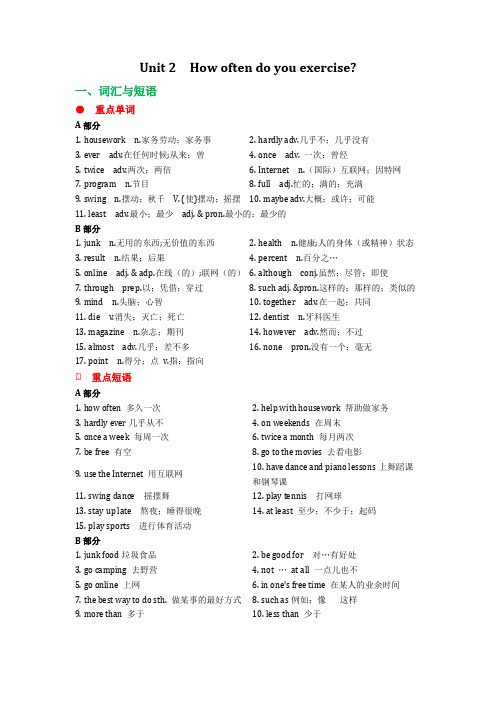
Unit 2 How often do you exercise?一、词汇与短语●重点单词A部分1.housework n.家务劳动;家务事2.hardly adv.几乎不;几乎没有3.ever adv.在任何时候;从来;曾4.once adv. 一次;曾经5.twice adv.两次;两倍6.Internet n.(国际)互联网;因特网7.program n.节目8.full adj.忙的;满的;充满9.swing n.摆动;秋千V. (使)摆动;摇摆10.maybe adv.大概;或许;可能11.least adv.最小;最少adj. & pron.最小的;最少的B部分1.junk n.无用的东西;无价值的东西2.health n.健康;人的身体(或精神)状态3.result n.结果;后果4.percent n.百分之…5.online adj. & adp.在线(的);联网(的)6.although conj.虽然;尽管;即使7.through prep.以;凭借;穿过8.such adj. &pron.这样的;那样的;类似的9.mind n.头脑;心智10.together adv.在一起;共同11.die v.消失;灭亡;死亡12.dentist n.牙科医生13.magazine n.杂志;期刊14.however adv.然而;不过15.almost adv.几乎;差不多16.none pron.没有一个;毫无17.point n.得分;点v.指;指向● 重点短语A部分1.how often 多久一次2.help with housework 帮助做家务3.hardly ever几乎从不4.on weekends 在周末5.once a week 每周一次6.twice a month 每月两次7.be free 有空8.go to the movies 去看电影e the Internet 用互联网10.have dance and piano lessons上舞蹈课和钢琴课11.swing dance 摇摆舞12.play tennis 打网球13.stay up late 熬夜;睡得很晚14.at least 至少;不少于;起码15.play sports 进行体育活动B部分1.junk food垃圾食品2.be good for 对…有好处3.go camping 去野营4.not …at all 一点儿也不5.go online 上网6.in one's free time 在某人的业余时间7.the best way to do sth. 做某事的最好方式8.such as例如;像这样9.more than 多于10.less than 少于● 重点句子A部分1.--What do you usually do on weekends? --I often go to the movies."在周末你通常做什么?”“我经常去看电影。
人教版八年级英语上册Unit2知识点精讲
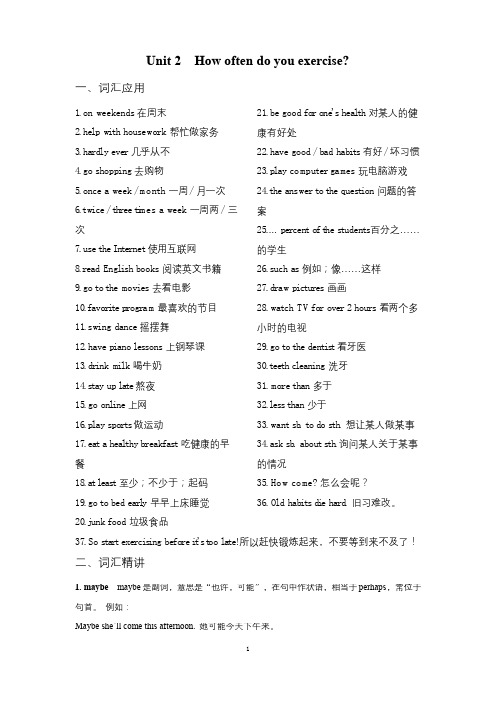
Unit 2 How often do you exercise?一、词汇应用1.on weekends 在周末21.be good for one 's hea l th 对某人的健 康有好处 2.he lp wi th housework 帮忙做家务3.hard ly ever 几乎从不22.have good / bad hab i t s 有好 / 坏习惯 23.p lay computer games 玩电脑游戏 24.the answer to t he ques t ion 问题的答 案 4.go shopping 去购物5.once a week / m onth 一周 / 月一次6.twice / th ree t i mes a week 一周两 / 三次25.... pe rcen t o f t he s tuden ts 百分之…… 的学生 e the In te rnet 使用互联网8.read Engl i sh books 阅读英文书籍9.go to the movies 去看电影10.favor i t e p rogram 最喜欢的节目11.swing dance 摇摆舞26.such as 例如;像……这样 27.d raw p ic tu res 画画 28.watch TV for over 2 hours 看两个多 小时的电视 12.have p iano l e ssons 上钢琴课13.d r ink mi lk 喝牛奶29.go to the den t i s t 看牙医 30.tee th c lean ing 洗牙 14.s tay up l a te 熬夜31.more than 多于 15.go on l ine 上网32.less than 少于 16.p lay spor t s 做运动33.want sb . to do s th . 想让某人做某事 34.ask sb . abou t s th .询问某人关于某事 的情况 17.ea t a hea l thy breakfas t 吃健康的早餐18.a t l eas t 至少;不少于;起码19.go to bed ea r l y 早早上床睡觉20.junk food 垃圾食品35.How come? 怎么会呢? 36.Old hab i t s d i e hard . 旧习难改。
人教版八年级上册英语Unit 2 知识点语法归纳总结

Unit 2 How often do you exercise?1.短语归纳2.典句必背3.用法集萃(1)How often do you watch TV? 你多久看一次❖how often意为“多长时间一次,每隔多久”,是对句中的often, usually,every day, sometimes, never, once a week等表示频率的词或短语提问,多用于一般现在时。
例:—How often do you go to see a film? 你多久看一次电影? —Once a week. 一周一次。
❖辨析:how often, how soon, how far与how long❖辨析sometimes, some times, sometime, some time(2)Oh, I have to play tennis with my friends. 哦,我必须和我的朋友们一起打网球。
❖have to意为“必须,不得不”,强调受客观条件的影响而“不得不去做某事”。
它有人称、数和时态的变化,在变为疑问句或否定句时要借助助动词do, does或did。
例:Does she have to go home now? 现在她必须回家吗?We had t walk to shoo yesterday. 昨天我们不得不步行去了学校。
(have to强调客观需要,must表示主观愿望和看法。
)(3)They often help with housework. 他们经常帮忙做家务。
❖help with意为“在某方面帮助”,是固定短语,也可写作help sb. with sth. 表示“在某方面帮助某人”❖拓展:help相关短语(4)But my mother wants me to drink it. 但是我妈妈想要我喝它(牛奶)。
❖want sb. to do sth. 属于“动词+宾语+宾补”的固定结构。
八年级语文上册第二单元知识点归纳(人教版)

- 1、下载文档前请自行甄别文档内容的完整性,平台不提供额外的编辑、内容补充、找答案等附加服务。
- 2、"仅部分预览"的文档,不可在线预览部分如存在完整性等问题,可反馈申请退款(可完整预览的文档不适用该条件!)。
- 3、如文档侵犯您的权益,请联系客服反馈,我们会尽快为您处理(人工客服工作时间:9:00-18:30)。
人教版八年级上册第二单元知识点(复习课用)一.词汇1.housework---合成词,不可数名词,homework,farmwork; do the housework;helpmother do/with the housework2.hardly adv几乎不,否定词,不与其它否定词连用,带有hardly句子,叫否定句Eg, Garry can hardly speak Chinese,__can he__?Eg, He ______ rides a bike to school.He likeswalking.A.oftenB.alwaysuallyD.hardly# 副词不能修饰名词,不能直接放在名词前。
Hardly +a/an+名词单数;hardly +any +名词复数/不可数名词Eg,I can hardly see_____ sheep on the hill.A.SomeB.anyC.anD.much# hardly ever=seldom 频度副词“几乎不”三词{be动词,情态动词,助动词}之后,一词(实意动词)之前It hardly ever rains in the north of China inwinter.He is hardly ever ill.3.ever 副词,“曾经”-------反义词never;Ever 常用于疑问句中,Have you ever been to China?4.次数表示法1),一次once,两次twice ----不规则2),三次three times ,四次four times ----三次以上:基数词—+times -----twenty timesI have been to Hefei three times.# 对次数提问how many times# 次数+时间段表示频度once a week;twice a month;three times a year.-------提问how often5.Internet 首字母大写,前加the,在互联网上on the Internet.类似:on the radio/on TV,on the computer/on the phone6.full 1) adj忙碌的------free-------busy# 主语为时间Tomorrow is full for me.—I will be busy tomorrow.2) adj满的-------empty “空的”# be full of …里充满了…The room is full of smoke.# fill vt ,填满,装满# be filled with…里装满了…3)adj“饱的”----hungry “饥饿的”Are you full?7.maybe 与may be 区别Maybe 副词“也许”,放在句首Maybe he is a teacher. May be 情态动词+be 动词原形“也许是,可能是”作谓语,放在主语之后,He may be a teacher.8.least ----little-----less对比much-----more-----most Eg, Can we do the ____work with the ____ money?A.less,moreB.least ,mostC.more,lessD.most,least At least 至少+数字------at most 最多,至多Less than 不到,少于;more than 超过,多于=over9.junk food 不可数10.coffee,juice,milk,orange,water,teaA cup of coffee11.health n,健康------healthy adj健康的名词作主语宾语(主语放句首,宾语放动词或介词之后)形容词----名前系后形容词;名词前作定语,系动词后作表语;Eg, You should eat ____ food .It’s good for your ____. Fruit and vegetables are very ____.12.as a result 结果As a result, he was late for school.Here is the result.13.10%----ten percent-----基数词+percent ,没有复数。
#百分数做主语,谓语看百分数代替的名词。
Eg,50% of the students in our class ____ from the countryside. A. is es14.shoppingonline;go online15. although 连词“虽然,尽管”引导让步状语从句,不与but 连用。
Eg, _____ he is very tired,____ he still works in the field.A.Although,/B.Although,butC./,but# =though,可以互换。
#让步状语从句“主将从现”---主句将来时,从句一般现在时。
Eg,We will go on working although it is rainy tomorrow.16.through----though对比Through 介词“通过,穿过”从物体内部穿过,Across “通过,穿过”从表面经过,还含有从一边到另一边。
Eg, Go ____ the street and you can get to the post office. The light got into the room ____ the window.The boys swim across the river.17.mind1)n,头脑,大脑,思维,思想Change one’s mind 改变主意2)动词“介意”Mind doing sth介意做某事Do you mind opening the door?18. such 与so 区别都含有“如此的,这样的…”Such adj ,修饰名词。
----such a/an adj + 名词单数Such + adj +名词复数/不可数名词Eg, I didn’t see such a clever boy before.# so adv修饰形容词副词。
So + adj/advEg, The flowers are ___ beautiful.These are ____ beautiful flowers.# 例外:当形容词表示数量many/much/few/little 前面必用so.There are so many people in the supermarket.19.play… together/let’s go together20.die vi不及物动词“死亡”The old man died yesterday.# die of/from 死于…# die 现在分词dying,过去式died名词death 形容词dead “死的”dying “快要死的”The old man’s ____ made his children very sad.He has been ____ for two days.He found a ___ dog on the road last Sunday.21. write----writer;teach---teacher;dancer;worker;singer Cleaner;22.dentist-----doctor-----nurse-----hospital23.however 与but 区别都表示转折“但是,然而”however 语气弱。
However 副词,单独使用,句首,句末,句中,加逗号隔开。
She lives far from the school.However, she is never late for school.But 连词,连接并列句,放在句首,后不加逗号。
She lives far from the school,but she is never late for school.24.than 与thenThan 连词“比”比较级的标志词He is taller than me.Then 副词“那时,然后,接着”He got up at six,and then he washed his face.25.almost 副词“几乎,差不多”=nearlyAlmost 可以修饰所有否定词no,not,nothing,no one…;放在否定词前。
Nearly 一般不修饰否定词,但可以修饰not 但要放在not 后。
26.none 三三两两不定代词“一个都没有,没有一个”#后加of +名词复数/人称代词宾格---三者以上都没有;None of the students in our class is from Japan.# none 一般不单用,但有上文,可指代上文的人或事物,可单用。
可指三者以上的人或事物,也可指不可数名词。
Is there any milk in the fridge?-No,____.A.nothingB.no oneC.noneD.neitherNone 强调数量,用How many 提问。
--- Howmany students are there in the classroom?--____A.No oneB.NoneC. NothingD.Nobody# no one /nobody 用who 提问。
表示两者中没有一个---neither27. pointn. “点,得分,分数”1.1---one point onehave a point 有道理,give one’s point 说出某人观点vi “指(点)”point to /at 指向…二.课文1.how often/ how long/how far /how soon/how many times1).how often “多久一次”问频度-----频度副词:always,usually,often,sometimes,hardlyever,never;every day/week/year/month/hour/minute;次数+时段once a week;2).how long “多久,多长时间,多长”---时间长度,物体长度How long is the ruler?How long will you stay here?-----For two days.how long 表示动作,状态持续了多长时间。
